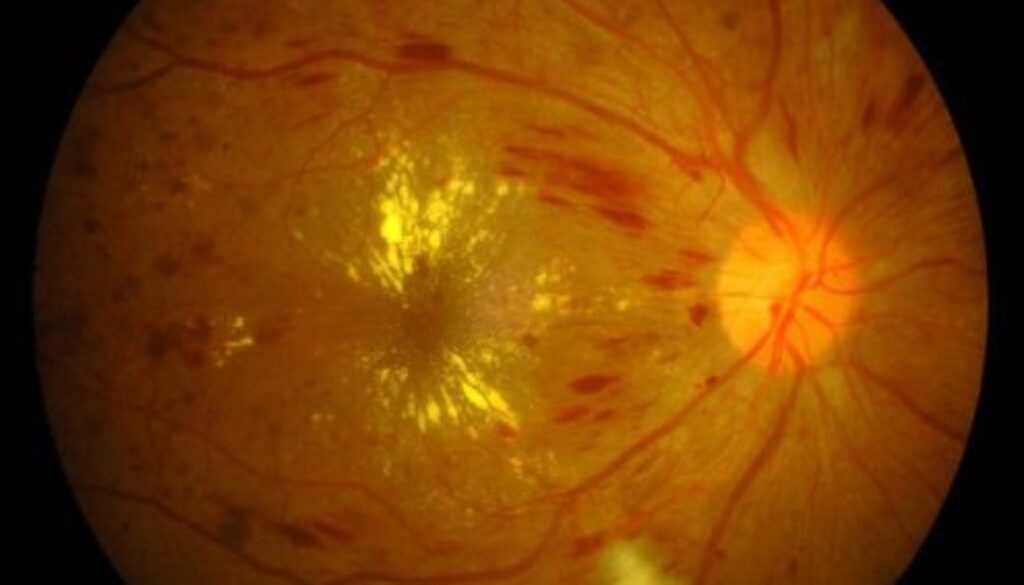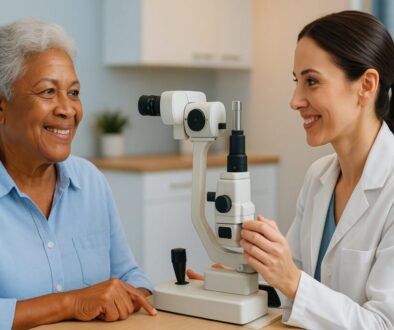Eye Exams Reveal Diabetes & High Blood Pressure Clues
High blood pressure (hypertension) and Diabetes are diseases that affect the blood vessels in your body. These diseases are very common and can affect many organs, including the eyes. Since the eye is the only place we can view the blood vessels directly (without surgery), an eye examination can provide a small glimpse into your overall health and identify signs of hypertension and diabetes.
Key Takeaways:
-
Eye exams detect hypertension/diabetes through retinal blood vessel changes.
-
Blurry/fluctuating vision may indicate uncontrolled blood sugar or blood pressure.
-
Hypertensive signs: narrowed arteries, cotton wool spots, retinal hemorrhages.
-
Diabetic signs: leaky vessels, exudates, macular edema, venous tortuosity.
-
Managing BP/diabetes slows retinopathy; collaborative care is critical.
-
Annual eye exams are vital for early detection and preventing vision loss.
-
Lifestyle changes (diet, exercise, no smoking) improve eye and systemic health.
Patient symptoms and signs:
- Fluctuating vision – If the blood pressure or blood sugar spikes due to diet or not taking medication as directed, the lens inside the eye can swell, or fluid in the retina can temporarily change the prescription of the eye.
- Blurry vision – vision that stays blurry could be due to more significant findings, including fluid or retinal bleeding (hemorrhages)
- Double vision – more often due to diabetic neuropathy where the disease is actually affecting the nerves which control the muscles around the eye.
Any of these symptoms should be a sign to visit your eye doctor to check the health of your eye and discuss with the doctor managing your high blood pressure or diabetes to determine if a different treatment is necessary.
What does your eye doctor see?
Signs of Hypertensive Retinopathy:
- Arteriolar compression or Venous nicking – when the walls of the arteries thicken, they can compress the underlying veins, limiting blood flow back to the heart
- Cotton wool spots – white fluffy areas in the retina signifying ischemia (or obstructed blood flow)
- Retinal hemorrhages – due to leaking blood vessels
- Other possible findings: optic nerve swelling, macular edema (fluid)
Signs of Diabetic Retinopathy:
- Venous tortuosity: When the blood vessels supplying the back of the eye become
- Retinal hemorrhages: due to leaking blood vessels
- Retinal exudates: lipids and proteins leaking from weakened blood vessels
- Macular edema: fluid that has leaked out of blood vessels can accumulate in the macula, the most critical area for sharp vision, often leading to blurry vision
- Other possible findings: optic nerve swelling, neovascularization (new blood vessel growth)
Treatment
The main goal for any of these findings is to treat or manage the underlying cause, which is high blood pressure and/or diabetes. Your eye doctor will report the findings to your primary care doctor or endocrinologist to be evaluated for lifestyle changes, start medication, or change medications to better manage your condition. If you have significant hypertensive or diabetic retinopathy and your vision is impacted, treatment with a retinal specialist may be required to reduce further damage to the eyes and preserve vision.
Revolutionary Eye Scans in Tamarac: AI & Polarized Light for Early Disease Detection
At Tamarac Eye Center, we’ve moved beyond traditional exams. Our advanced polarized light imaging and artificial intelligence (AI) systems detect diabetic and hypertensive retinopathy up to 18 months earlier than standard methods – often before symptoms appear.
How Polarized Light Protects Tamarac Patients
This glare-reducing technology enhances retinal contrast 3x better than conventional imaging. By highlighting subtle blood vessel changes and microaneurysms invisible to standard cameras, we catch diabetic retinopathy at its most treatable stage.
AI Screening: Precision Medicine for South Florida
Our deep learning algorithms analyze 12,000+ retinal patterns with 98.7% diagnostic accuracy. This enables:
-
Early intervention before vision loss occurs
-
Telemedicine screenings for homebound Tamarac seniors
-
Instant risk stratification during routine exams
The Link Between Eye Health and Systemic Health
Your eyes are more than just vision tools—they’re a mirror of your overall health. For Tamarac residents, regular eye exams at West Broward Eyecare Associates can uncover early signs of systemic conditions like hypertension, diabetes, and even heart disease. Here’s why:
-
Blood Vessel Clues: The retina’s blood vessels resemble those in your brain, kidneys, and heart. Damage here (e.g., narrowed arteries, leaks) often signals similar issues elsewhere.
-
Local Impact: Broward County’s high rates of diabetes and hypertension make annual eye exams critical. Untreated retinopathy in Tamarac patients correlates with higher risks of stroke and kidney disease.
-
Actionable Insight: Early detection of hypertensive retinopathy can prompt life-saving interventions, like adjusting blood pressure medications or improving diet.
Preventive Measures and Lifestyle Changes
Protecting your eyes starts with daily habits. For Tamarac and Coral Springs eye patients managing diabetes or hypertension, these steps can slow retinopathy progression:
-
Diet for Eye Health:
-
Choose low-sodium options (try fresh produce from Tamarac’s farmers’ markets).
-
Opt for high-fiber, low-glycemic foods (e.g., whole grains, lean proteins) to stabilize blood sugar.
-
-
Stay Active: Walk or bike through Tamarac’s parks (like Tamarac Sports Complex) to boost circulation and lower blood pressure.
-
Quit Smoking: Smoking worsens vascular damage—ask your Tamarac eye doctor about local cessation programs.
-
Monitor Regularly: Use at-home blood pressure cuffs or glucose meters, and share results with your Broward County healthcare team.
Stages of Hypertensive and Diabetic Retinopathy
Understanding retinopathy progression helps Tamarac patients act early:
Hypertensive Retinopathy:
-
Mild: Arteries narrow; often reversible with better blood pressure control.
-
Moderate: Cotton wool spots, hemorrhages; requires medication adjustments.
-
Severe: Optic nerve swelling or retinal detachment; urgent care needed.
Diabetic Retinopathy:
-
Early Stage: Microaneurysms (tiny bulges in vessels); manageable with blood sugar control.
-
Advanced Stage: New, fragile blood vessels form; laser treatment or injections may be needed.
The Role of Collaborative Care.
Managing chronic diseases requires teamwork:
-
Local Expertise: Your Tamarac eye doctor coordinates with Broward Health specialists, endocrinologists, and nutritionists.
-
Case Example: A retinal hemorrhage spotted during an exam might prompt your PCP to adjust blood pressure meds or recommend a Tamarac-based dietitian.
-
Community Focus: We partner with the Broward County Diabetes Coalition to ensure seamless care for Tamarac patients.
What to Expect During a Comprehensive Eye Exam in Tamarac
At West Broward Eyecare Associates, your exam includes:
-
Dilation: Eye drops widen pupils to inspect retinas (plan for sunglasses post-exam!).
-
Advanced Imaging: OCT scans map retinal layers for early edema or leaks.
-
Pressure Check: Quick, painless glaucoma screening.
-
Personalized Review: Your Tamarac eye doctor explains findings and shares results with your primary care team.
No Surprises: Most exams take 60–90 minutes. Bring your current medications and insurance card!
If you have been diagnosed with High Blood Pressure or Diabetes, it is important to evaluate the health of the eyes every year, even if you are seeing well. Call to book an appointment for your comprehensive eye exam today at 954-726-0204 or book online!
FAQs
-
High blood pressure can damage the blood vessels in your eyes, leading to conditions like hypertensive retinopathy, which can cause vision problems and, in severe cases, permanent damage.





